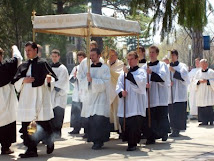Discernment. 1 : the quality of being able to grasp and comprehend what is obscure : skill in discerning. This definition from Webster's, while accurate, only hints at the meaning those in religious life have invested in the term (Vocations Placement [VP]).
Obscure indeed: how can one be sure that God is calling them to a life of professional commitment to the Church? Many have felt nearly overwhelmed with the beauty of a liturgical service; with a passionate sermon or religious work of prose or poetry; with the seemingly inexhaustible energy and love of a Mother Teresa of Calcutta. It is perfectly natural that our wonder at such beauty inspires us to imitate those who practice it. We are positively called to do so, each of us, and we must strive to meet that calling with all our energy, freely giving of ourselves and our talents in the process. Doing so, however, does not require one to commit to the life of a priest, nun, brother or deacon. It is fully possible to follow God’s will within any context life might bring.
Discernment, in “vocational” terms, is a process undertaken by those who are striving to follow God’s will in every daily activity, who have done so for quite a while, but are still feeling a call to investigate whether God is asking them to fulfill their commitment to Him as a priest, nun, brother or deacon. Such people know that this commitment will lead to many sacrifices, including a vow of celibacy, a communal lifestyle, long hours, and some trying times with people in need. Nevertheless, the thought routinely (if quietly) keeps recurring to them: “is this what God is asking of me?” (VP).
For more information on discernment to religious life, please visit my freind, Brad Watkins blog at romancatholicvocations.blogspot.com (A link is also located on the right side of this blog)
Christian Education
"Since all Christians have become by rebirth of water and the Holy Spirit a new creature(8) so that they should be called and should be children of God, they have a right to a Christian education. A Christian education does not merely strive for the maturing of a human person as just now described, but has as its principal purpose this goal: that the baptized, while they are gradually introduced the knowledge of the mystery of salvation, become ever more aware of the gift of Faith they have received, and that they learn in addition how to worship God the Father in spirit and truth (cf. John 4:23) especially in liturgical action, and be conformed in their personal lives according to the new man created in justice and holiness of truth (Eph. 4:22-24); also that they develop into perfect manhood, to the mature measure of the fullness of Christ (cf. Eph. 4:13) and strive for the growth of the Mystical Body; moreover, that aware of their calling, they learn not only how to bear witness to the hope that is in them (cf. Peter 3:15) but also how to help in the Christian formation of the world that takes place when natural powers viewed in the full consideration of man redeemed by Christ contribute to the good of the whole society.(9) Wherefore this sacred synod recalls to pastors of souls their most serious obligation to see to it that all the faithful, but especially the youth who are the hope of the Church, enjoy this Christian education."
Gravissimum Educationis
Gravissimum Educationis
Saturday, March 21, 2009
Subscribe to:
Post Comments (Atom)




































No comments:
Post a Comment